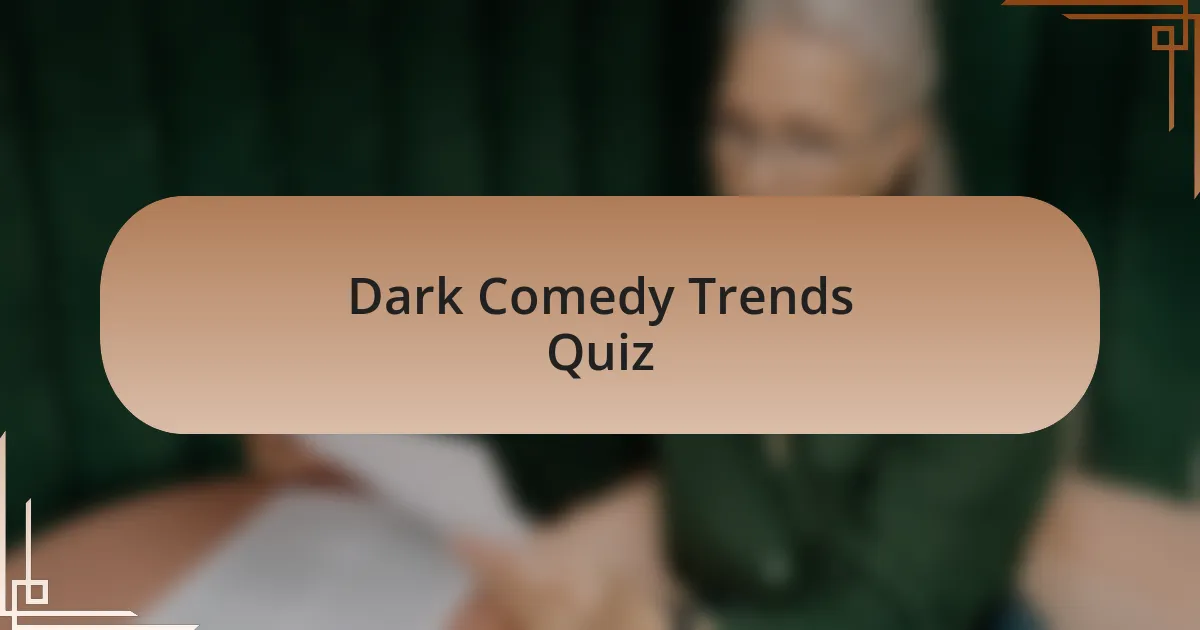Start of Dark Comedy Trends Quiz
1. What is the primary focus of dark comedy?
- Blending horror and humor to deliver satirical perspectives on serious or taboo subjects.
- Telling funny stories about animals and their adventures.
- Focusing on lighthearted humor that avoids sensitive topics.
- Creating silly jokes about everyday life with no deeper meaning.
2. Which TV shows have embraced dark humor?
- `Black Mirror` and `BoJack Horseman.`
- `Parks and Recreation`
- `The Office`
- `Friends`
3. What is the significance of dark comedy in modern culture?
- It focuses on making light of everyday life without deeper meaning.
- It promotes censorship of serious subjects to avoid offense.
- It aims to trivialize major global issues for entertainment.
- It reflects society`s growing willingness to confront uncomfortable truths and find humor in adversity.
4. How has the rise of social media impacted dark humor?
- Social media has provided a space for people to connect over shared interests, creating a vibrant community of humor enthusiasts.
- Social media has made dark humor illegal in many countries.
- Social media encourages only light-hearted jokes and memes without any dark themes.
- Social media has led to a decline in all forms of humor, including dark humor.
5. What are some examples of messed up jokes with a twist?
- `What do you call a fake noodle? An impasta!`
- `Why don’t scientists trust atoms? Because they make up everything!`
- `Why did the skeleton cross the road? To get to the other side!`
- `Why don’t graveyards ever get overcrowded? Because people are dying to get in.`
6. What are the benefits of engaging with dark humor?
- It is only for sadistic individuals with no empathy.
- It serves no purpose and is often misunderstood.
- It makes people feel worse about their lives and choices.
- It can improve mental health, enhance creativity, and foster a sense of community.
7. How does dark humor impact society?
- It strictly aims to provoke outrage and avoid serious discussions.
- It has no real impact and is only enjoyed by a small audience.
- It serves primarily to make people feel uncomfortable and disconnected.
- It can both foster a sense of community and resilience, but also perpetuate harmful stereotypes and normalize inappropriate behavior.
8. What are some tips for writing effective messed up jokes?
- Only focus on popular trends and make fun of sensitive topics.
- Use only shock value and avoid any genuine emotions in your jokes.
- Start with a relatable premise, add an unexpected twist, be mindful of cultural sensitivities, and test your jokes on a diverse group of people.
- Write long-winded jokes to confuse your audience.
9. Which films are examples of dark comedies released in 2025?
- *Companion* and *Heart Eyes*
- *The Happy Dark*
- *Smiling at Death*
- *Laughing Sadness*
10. What is the plot of *Companion*?
- It tells the story of a chef who accidentally becomes a famous food critic.
- The film follows a couple whose weekend getaway turns catastrophic after one of the guests is murdered, revealing that Iris is a robot programmed by Josh.
- The plot revolves around a dog with magical powers who helps a lonely man find love.
- The film centers on a detective who solves a mystery involving stolen cookies.
11. What is the plot of *Heart Eyes*?
- The story follows two rival comedians competing for a big break during a comedy festival.
- The plot centers on a detective solving a mystery involving a missing cat in a small town.
- The film revolves around a couple, Ally and Jay, navigating love while avoiding a relentless serial killer.
- A group of friends goes on a road trip that leads to supernatural events and comedic mishaps.
12. How does *Companion* use humor?
- The humor in *Companion* is primarily derived from the exaggerated expressions of the robot Iris during chaotic moments.
- The humor in *Companion* focuses on the slapstick comedy of mistaken identities among the guests.
- The humor in *Companion* comes from the karma Josh faces for his plot against Iris, showcasing his continuous failures amidst the chaos.
- The humor in *Companion* arises from the quirky dance scenes that break the tension of the drama.
13. How does *Heart Eyes* use humor?
- The humor in *Heart Eyes* is mainly derived from slapstick comedy involving physical gags and pratfalls.
- The humor in *Heart Eyes* is focused on non-stop puns about the couple`s awkward relationship dilemmas.
- The humor in *Heart Eyes* is primarily based on sarcastic commentary about social media trends.
- The humor in *Heart Eyes* primarily comes from the ridiculous love story between Ally and Jay, who make over-the-top decisions while being attacked by the serial killer.
14. What is special about the conversations in the context of dark comedy?
- They often involve complex themes and societal issues, using humor to explore these topics.
- They focus solely on light-hearted jokes unrelated to serious topics.
- They are characterized by shallow conversations with no depth.
- They avoid discussing anything uncomfortable or taboo.
15. Which comedy movies are expected to be released in 2025?
- `Laughing Matter`
- `Back in Action`
- `Funny Business`
- `Comedy Central`
16. What is *Back in Action* about?
- It is a romantic drama about a couple overcoming their differences and falling in love.
- It follows a detective solving a series of comical crimes in a small town.
- It is an action-comedy hybrid starring Cameron Diaz and Jamie Foxx as a couple who are pulled back into their secret spy identities.
- It is a horror film where the main characters battle supernatural forces to survive.
17. What is *On Becoming a Guinea Fowl* about?
- A documentary about birdwatching adventures.
- A horror film set in a haunted house.
- A dark comedy about family secrets.
- A romantic comedy about two lovers.
18. What is *A Nice Indian Boy* about?
- It is a horror film about a haunted wedding venue.
- It is a documentary about Indian cooking traditions.
- It is an action movie featuring a comical chase during a wedding.
- It is a wedding hijinks rom-com about an Indian family accepting their son`s love for a white man.
19. What is *The Naked Gun* about?
- A bumbling detective trying to solve a crime while causing chaos.
- A horror film about a haunted police station.
- A romantic drama about a couple`s love story.
- An action thriller involving spies and espionage.
20. What is *Knives Out: Wake Up Dead Man* about?
- It follows a chef who discovers a magical knife that cooks for him.
- It focuses on a detective who solves crimes using culinary skills.
- It tells the story of a family that opens a restaurant after a murder.
- It is the third *Knives Out* movie, revolving around a murder mystery with a stacked cast of suspects.
21. Who is the Senior Culture Editor at Marie Claire?
- Jane Doe
- Lucy Liu
- Emma Stone
- Sadie Bell
22. What are some conversation topics that people might discuss when meeting for the first time?
- Names, interests, jobs, hobbies, and personal experiences.
- Quantum physics and astrophysics.
- Weather patterns and climate change.
- Global economic theories.
23. How might images of exhausted soldiers be described?
- Silly and playful.
- Frighteningly iconic or striking.
- Calm and serene.
- Happy and cheerful.
24. What are some adjectives that might describe someone who is always asking questions?
- Carefree
- Stubborn
- Obnoxious
- Inquisitive
25. What are some ingredients that someone might look for in an ideal job?
- A job that involves only paperwork and no interaction.
- Creativity, spontaneity, and a sense of community.
- Strict deadlines and endless meetings.
- An overly serious environment with no fun.
26. What are some questions that someone might ask a potential flatmate?
- How do you feel about karaoke?
- Do you believe in ghosts?
- About cleanliness, noise levels, and shared responsibilities.
- What’s your favorite pizza topping?
27. What music might someone have on their phone or MP3 player?
- Only classical compositions and opera.
- A variety of genres, including pop, rock, and electronic music.
- Just soundtracks from video games.
- Only country and folk tunes.
28. How might someone describe themselves as a good climber, swimmer, and sailor?
- Tentative explorer.
- Well-rounded adventurer.
- Underwater basket weaver.
- Professional couch potato.
29. What are some conversation topics that someone might avoid asking in their culture or country?
- Do you like weird pet names?
- Personal or sensitive topics like politics or family issues.
- How much money do you make?
- What is your favorite pizza topping?
30. What are some expressions that might be used to describe someone who is always busy?
- Still as a statue
- Quiet as a mouse
- Lazy as a sloth
- Busy as a bee
Quiz Completed: Thank You for Participating!
Congratulations on completing the quiz about Dark Comedy Trends! We hope you enjoyed the challenge and discovered new insights into this intriguing humor genre. Dark comedy often straddles the line between laughter and discomfort. By engaging with this topic, you’ve likely gained a deeper understanding of how humor can reflect societal issues and push boundaries.
Throughout the quiz, you may have learned about various styles, influential comedians, and the historical context of dark comedy. It’s fascinating how this genre uses irony and satire to provoke thought while still entertaining. Each question helped to highlight the unique elements that define dark humor, as well as its impact on audiences.
If you found this topic interesting, we invite you to explore our next section dedicated to Dark Comedy Trends. This resource expands on the quiz content, offering further insights and examples. Delve deeper into the evolving landscape of dark humor, and enhance your understanding of why it resonates with so many. Happy learning!
Dark Comedy Trends
Understanding Dark Comedy
Dark comedy, also known as black humor, uses humor to explore serious, taboo, or distressing subjects. It often addresses themes like death, illness, or tragedy. The intent is to provoke thought while evoking laughter, offering a unique lens on the human experience. Its subversive nature allows audiences to confront uncomfortable truths in a lighter way. Comedians like Louis C.K. and Sarah Silverman exemplify this genre through their work, effectively blending humor with poignant social commentary.
Historical Context of Dark Comedy
Dark comedy has roots in literature and theatre, dating back to works like Shakespeare’s tragedies, which included elements of humor amidst despair. The genre gained prominence in the 20th century during times of social upheaval. The absurdity of life and death became fertile ground for comedians to engage audiences. The impact of events like the World Wars influenced many writers and performers, pushing the boundaries of humor to reflect societal anxieties.
Current Trends in Dark Comedy
Recently, dark comedy has seen a resurgence with shows like “The Boys” and “Bojack Horseman.” These series tackle complex issues such as mental health and societal decay through humor. The rise of social media amplifies these trends, allowing creators to share shorter, impactful content. Online platforms foster communities where audiences discuss and unpack these themes, making dark comedy more accessible and relevant to contemporary issues.
Demographic Appeal of Dark Comedy
Dark comedy appeals mainly to younger audiences seeking relatable content in a complex world. Millennials and Gen Z often appreciate humor that challenges societal norms and stereotypes. This demographic values authenticity and vulnerability in storytelling. The use of irreverence in podcasts and stand-up comedy resonates with their experiences, making dark themes more palatable. Surveys indicate that younger viewers are more likely to embrace humor addressing sensitive topics.
The Ethical Boundaries of Dark Comedy
Dark comedy raises significant ethical questions about taste and appropriateness. It often navigates sensitive subjects that may offend some audiences. Comedians and writers must balance humor with respect for those affected by the issues they explore. The discussion around this balance is ongoing, as different cultures and communities have varying thresholds for what constitutes acceptable humor. Critics argue that while dark comedy can challenge taboos, it risks perpetuating harmful stereotypes if executed poorly.
What are Dark Comedy Trends?
Dark comedy trends involve humor that addresses topics typically regarded as serious, taboo, or distressing. This genre often explores themes like death, illness, and societal issues through a comedic lens. Recent trends have shown an increase in dark comedies on streaming platforms, where shows like “The Boys” and movies like “Jojo Rabbit” have gained popularity. Notably, the rise of social media has also amplified sharing and engagement with dark humor content.
How has Dark Comedy evolved in recent years?
Dark comedy has evolved by merging with social commentary, reflecting current societal issues and cultural events. Comedians and writers now frequently incorporate elements such as racial or political satire to highlight absurdities in serious situations. According to the Pew Research Center, approximately 60% of adult respondents reported enjoying humor that comments on political or social matters, indicating a shift toward more culturally relevant dark comedy.
Where is Dark Comedy most popular?
Dark comedy is particularly popular in the United States and the United Kingdom. In these regions, it appears across various media, including television shows, films, and stand-up comedy. Recent streaming successes, such as “Dead to Me” and “Fargo,” showcase dark humor’s reach. Additionally, podcast platforms feature dark comedic content, making it accessible to a broader audience.
When did Dark Comedy gain mainstream attention?
Dark comedy gained mainstream attention in the late 1990s and early 2000s, particularly with the success of shows like “The Sopranos” and “Curb Your Enthusiasm.” This period marked a shift where darker themes were presented with humor, appealing to audiences seeking more complex narratives. The trend solidified in the 2010s as streaming services began to adopt dark comedy narratives, leading to widespread acceptance in popular culture.
Who are notable figures in Dark Comedy?
Notable figures in dark comedy include comedians like Louis C.K., Ricky Gervais, and Sarah Silverman. Their work often features humor that balances serious subjects with laughter, resonating with audiences. For example, Gervais’s approach to celebrity and mortality in shows like “After Life” exemplifies modern dark comedy’s appeal. Their influence helps shape the genre, drawing both acclaim and controversy in discussions about humor and social sensitivity.


